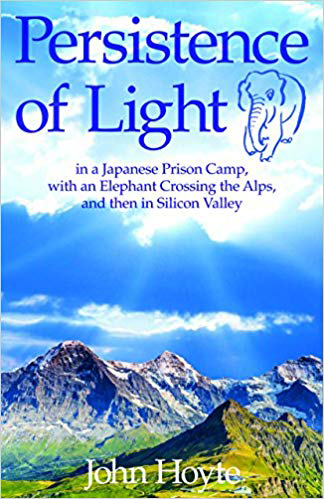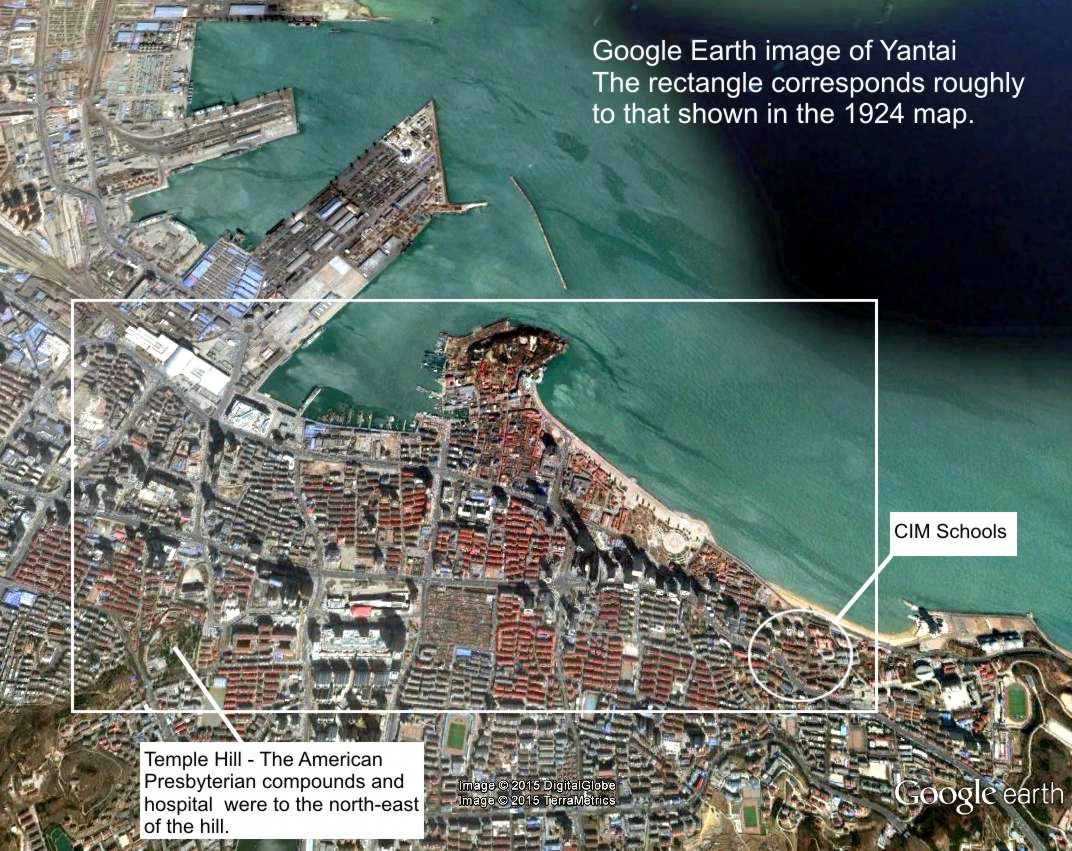
- by John Hoyte
[excerpts ...]

... “With six children at the school, our parents had asked the mission leaders if they could remain at Chefoo, but Dad was badly needed to be superintendent of the hospital at Lanchow. Looking back, how we wished that he had said “no” and insisted on either staying at Chefoo or, if that did not work out for the mission, taking us all back to England for our education. Hindsight is easy, but at the time, missionaries seldom questioned the decisions of their mission board. Also, little did we know of the coming attack on Pearl Harbor, and there were certainly expectations that we would be together for another Chefoo holiday in the foreseeable future. Our mother hated to show us children how much she felt the parting. She did not want to add to our distress, so spoke brightly of the holidays we would have together in the future. Yet as she left Elizabeth, her youngest, she completely broke down in the headmistress’s room after saying goodbye. It took great courage to compose herself and face the future.
So it was that we were orphaned for five years, for instead of seeing Mom and Dad the next summer as anticipated, we faced a Japanese internment camp. My brother Rupert later wrote about his sadness when told that we would be taking up boarding again at school. The devotion that our parents had to their missionary calling had always seemed to him so totally genuine and of overriding importance that he thought he could honestly say he never really resented it. In this, he considered himself most fortunate, knowing that many children of missionaries have continued through life with much resentment. That was Rupert’s response.
However, each of us six responded differently, and we have all had to struggle over the separation—a full five years from our father and forever from our mother, or at least for this lifetime.
I was still at the prep school and felt particularly lonely and sad that first Christmas after Mom and Dad left. The teachers did their best to comfort Elizabeth and me, but we needed the family comfort that no boarding school could supply. Our siblings were separated from us in the upper grades, and the boys’ and girls’ schools were in different buildings. One huge encouragement for me was that Miss Stark, who taught art and literature, praised my drawing abilities and encouraged me to draw and color a Christmas card for my parents. Her enthusiasm was infectious. I suddenly experienced a new sense of self-worth in spite of the loss of Mom and Dad and our close-knit family unit. This made a huge difference to me at this crucial time in my life.
Most of my experiences in the prep school were with other boys and girls my age, and I do not recall spending time with my older brothers and sister. This was one of the problems of boarding school life. Siblings tended to be separated by grade and so lose family cohesion.
We used to explore the hills behind Chefoo, and at one point, three of us found a low, narrow tunnel in the foothills. Smaller friends managed to get through, but I became stuck at a very narrow point and panicked. The experience of lying there in complete darkness unable to move forward or backward was terrifying. Praying calmed me down, and inch by inch I worked my way backward and out again with just a few scratches. The experience fits so well into my theme of light and its corollary darkness. The dark, coupled with total immobility, became synonymous, a kind of paralysis. That fit my mental state.
There were times when we prepites were quite rebellious, and once, a group of us sat in the school’s central courtyard refusing to move or obey any of our teachers’ requests. I do not recall what the outward reason for the revolt was, and on the whole, the teachers were loving and patient with us. But they were not our parents, and so for all this time, we had a deep ache inside. Now I understand it as a sign of the shades of darkness and separation we all were experiencing.
THE STORM STRIKES
Forget your perfect offering.
There is a crack in everything
That’s how the light gets in.
—Leonard Cohen
It was December of 1941, and I was walking along the beach with some friends. Out to sea a huge storm was gathering with dark and sinister clouds. A stiff salt wind was springing up, and I suddenly felt chilled. The storm was moving quickly in our direction, and we began to look for cover. An older boy ran up to us shouting:
“Have you heard? The Japs have attacked the American fleet at Pearl Harbor, and we are at war with Japan.”
How does a nine-year-old boy react to such news? I immediately connected it with the storm at sea and felt a simultaneous sensation of dread and excitement. A huge storm was coming, and we would be caught up in it. I felt dread at what the Japanese might do to us and excitement at the possibility of adventure in this new, unpredictable world. Danger thrummed through my being as my friends and I scurried for cover.
A few days later, we had another surprise. Along the main road into town came several hundred Japanese cavalry in double file. At first, we just heard the clip-clop of hooves, and then turned wide-eyed to the improbable scene.
It was vivid: The harnesses jingled, horses whinnied, the smell of horse manure wafted on the air. The leader shouted strange commands in Japanese, and each rider wore a long curved sword.
It seemed like a war movie projecting me back into World War I. But it was real. I now realized that indeed, we were enemy aliens.
The United States and Britain both had declared war on Japan, and life under Japanese control would be quite different from now on.
Our headmaster Mr. Bruce, was taken into custody for a month, and our ability to travel out of the mission compound was restricted. We had to wear armbands wherever we went. The teachers began to prepare us for the tough time ahead. At that moment, I wished Morn and Dad were not so far away but right here with us at Chefoo. I was an orphan placed twice into jeopardy. It was dark. The storm had hit.
TEMPLE HILL INTERNMENT
Eventually, the Japanese military took over the whole school compound, and the two hundred students and teachers were forced to move to Temple Hill on the other side of town, into three houses built to each house a family of six. We managed to squeeze into them and every square inch was precious. After we had been marched out of our old school buildings and had a chance to look around, it was discovered that all the light bulbs had been stolen from our new confinement. My oldest brother, Robin, had the presence of mind to somehow sneak back into the school and fill an old suitcase with as many light bulbs as he could find. When the Japanese guard challenged him as he left the compound, he just replied with a nonchalant beerdee dungshee, meaning that he had some things. Amazingly, he was not searched, and we enjoyed the benefits of his courage for many months to come. How proud I was of my big brother! During those sardine months on Temple Hill, food became very scarce not only in our camp but also in town. The Japanese commandant was a Christian and could give us more food than was available to the townsfolk, including German and Italian missionaries who, of course, were not imprisoned.
This raised an interesting question: How did we as proudly British missionaries and “mishkids” relate to missionaries from enemy countries? I am thankful to say that generally, we treated each other with goodwill and respect. However, I do recall that before Mom and Dad left, a German missionary family living next door repeatedly sang nationalistic German songs. We were duly distressed but kept this to ourselves like good Christians. Our thoughts were not so holy!
Since the walls around our makeshift camp were only six feet high, it would have been easy to escape. But as conditions were worse outside than inside, we naturally didn’t. In fact, the reverse took place. Chinese thieves would climb in and take what they could.
This led to my first attempt at writing a brief memoir, complete with sketches of the camp compound and a thief climbing down from a veranda:
THIEVES
There are a number of Chinese people who live in some houses just behind our camp, and they can see very well onto our verandahs.
They watched where we kept things, and they knew that on the front and side verandahs, there were rows of boxes. They decided that they would come and steal a lot of things. June 15. In the early morning of Foundation Day the big boys were sleeping in the garden when a thief crept up to our verandah. Costerus heard him and called out, first in English and then in Chinese. Then he sent Theo Bazire to tell Mr. Bazire that there was a thief. Costerus himself went to the kitchen to get a mop. The thief heard some noises, so he thought he would go down the stairs. But luckily Mr. Bazire was at the bottom, so he went back onto the verandah and climbed down a pillar and ran. The boys saw him and gave chase. The man tripped up and was taken to the boys’ room as a captive.
They tied him up and took him to the laundry room. They gave him a mattress and drink. Mr. Bazire sat outside, guarding him in a deck chair, and at 5:30 AM, he went to light the kitchen fire. Before he went, he loosened the man’s hands “to make him feel more comfortable.” Then he left a boy to keep guard on the thief. The thief slipped his hands out of the loops where his wrists were tied and moved a tub to get out of the window. When he was out, he climbed over a wall, so he escaped after all. All the grownups were very relieved for they thought he would be hurt by the Japanese if we handed him over.
Such is the situation when a compassionate missionary captures a thief under an authoritarian dictatorship! I cannot remember if the Japanese commandant was a Christian at this stage or not.
 #
#
http://www.weihsien-paintings.org/JohnHoyte/JHoyte(web).pdf
#


#








